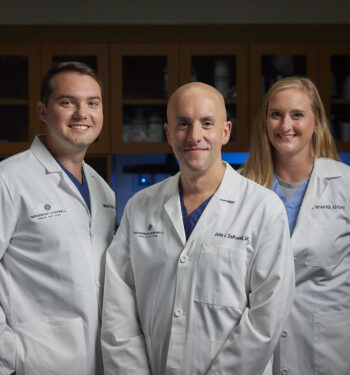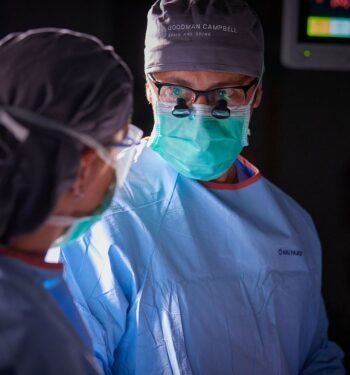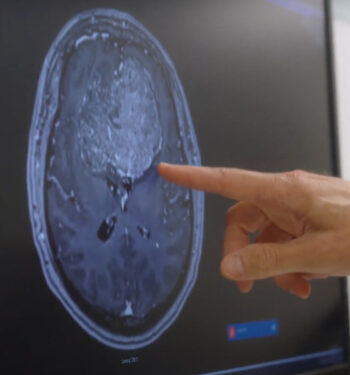
Something we hear a lot from patients and referring providers is that they don’t want to “bother” us with brain and spine issues they consider minor. But to be able to address rare and complicated conditions means we have an extremely thorough knowledge of the brain and spine. That expertise applies as well to simple treatments, like addressing pain from muscle spasms and or arthritic spine pain without surgery, as it does to complex procedures like an endoscopic skull base surgery.
When we say our work spans “the simple to the complex,” we mean it. That applies to all the ways we can make life easier for you and your patients, which can include surgery but often does not: We look for minimally invasive solutions wherever possible. We want to work with more providers to help more patients find healthier outcomes, and so we thought it might be helpful to expand on what “simple to complex” really means to us.
Specialization Doesn’t Mean Limitation
It’s true that neurosurgeons fulfill more intensive training requirements than any other medical specialty—seven years of residency, compared with three or four years for most specialties and five years for orthopedic surgeons. That degree of specialized expertise sets us apart, but it doesn’t limit our commitment to patient care. Yes, we handle certain conditions that no other specialty can address, but we also are trained to handle more common conditions.
Leading-edge care doesn’t always mean addressing complex conditions; it also means bringing experience and innovative thinking to the simple ones. If it’s related to the brain or spine, we are ready to treat it and have almost certainly done so countless times, whether it’s straightforward herniated discs from sports injuries, myelopathy and radiculopathy related to degenerative disease, or brain tumors and scoliosis requiring complex surgeries.
From the Simple to the Complex: A Few Examples
The range of treatments we offer plays out across our practice in too many ways to enumerate, but to give you a more detailed idea of how our capabilities span the simple to the complex, here are some examples across just a few categories:
- Spine: Our surgeons handle the spinal tumors and deformities you probably expect, but they also address neck and back pain and degenerative spinal disease—and across treatment options like steroid injections, nerve blocks, minimally invasive spinal surgery, multi-level fusions, and deformity correction surgery.
- Cranial: From monitoring slow-growing brain tumors, to complex benign and malignant tumor resection, and trigeminal neuralgia treatments, our cranial neurosurgeons are experts in their field.Our surgeons have advanced training in skull base tumors like pituitary tumors, meningiomas, and schwannomas, in addition to cerebrovascular conditions.
- Traumatic Brain and Spine Injuries: Where impact causes harm to the brain or spine, the range of treatment spans from observation to ventriculostomy to drain cerebrospinal fluid and relieve pressure in the brain or decompression and fusion to heal a fracture and address pressure on delicate nerves in the spinal canal.
- Functional Neurosurgery: For movement disorders, epilepsy, chronic pain, and otherconditions involving the nervous system, our team is skilled in treatments like intrathecal pump implantation for treating spasticity and deep brain stimulation for movement disorders like Parkinson’s. They also provide solutions where other approaches have failed through treatments like epilepsy lesioning procedures and stereotactic ablation.
- Neurovascular Conditions: Our team is experienced in addressing the full range of conditions that impact blood flow to the brain or spinal cord, including aneurysm care, an arteriovenous fistula on the spine that may need simple observation, embolization, or disconnection surgery.
- Pediatrics: Our pediatric neurosurgery team cares for a wide range of pediatric conditions from tethered cord and skull lesions to complex brain and spinal tumors. Pediatric neurosurgery is a subspecialty within neurosurgery with its own board certification, and our dedicated pediatric team brings unmatched expertise to caring for children and adolescents.
- Interventional Neuroradiology: From epistaxis embolization, carotid endarterectomy or carotid angioplasty, emergent thrombectomies for the treatment of stroke, and flow diversion in the case of aneurysms, our neuro interventionalists are highly trained and experienced in their specialty. Our team performs stroke coverage across three hospital systems in the metro Indianapolis area—Ascension St. Vincent, Community Hospital East, and Franciscan Health.
Collaborating Toward Extraordinary Outcomes
Specialization becomes even more valuable when it’s applied in collaboration with others. Working together as a care team enables innovation and improves outcomes for patients, which is why our team is committed to multidisciplinary and interdisciplinary care.
The appropriate mix of specialists and advanced practice providers provides exceptional patient care, and our collaborative approach extends to our referring providers and the broader care team. It also means we hold weekly internal conferences to present and review patient cases. In this way and in our commitment to quality and research, we stay on the leading edge, whether we’re treating a spine fracture or performing an awake craniotomy, and our patients reach their healthiest outcomes.
How Can We Collaborate?
Let’s work together to deliver exceptional brain, spine, and nerve care to your patients. Learn more about working with us, or give us a call at 317-396-1300.



